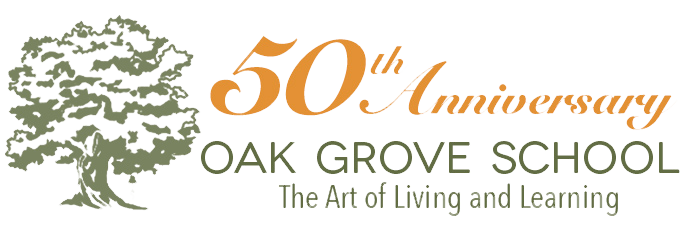Aftercare & Summer Programs, Outdoor Education, Travel, and Mindfulness
Summer Program
Oak Grove’s Summer Camps were put on hold at the beginning of the pandemic. We are evaluating the possibility of re-opening this popular program.
Aftercare Program (K-4)
In the Aftercare program, students engage in games, arts & crafts, wood crafts, special projects, beading, stories & reading, supervised free play, and homework help. The program is open to Oak Grove students. We support creativity and intelligence in an atmosphere of playful cooperation and relaxation.
Awakening Natural Relationship through Camping and Exploration
Closeness with nature begins early at Oak Grove School. The wooded campus is bordered by acres of oak groves and wetlands, and the curriculum and daily schedule provide for large blocks of outdoor activity. On a given day, preschool children explore fields in search of seasonal insects and flowers, elementary classes tend herbs and vegetables, middle school students sketch in a rose garden, and high school sophomores spend biology class in a grove observing the web of life through energy exchange. Familiarity with and comfort in nature is emphasized across the school, and nowhere is this better manifested than in the camping program. Through a graduated sequence of trips, students build their confidence, self-sufficiency, awareness, and appreciation of beauty. Most importantly, they develop self-knowledge through a relationship with nature and each other.
Mindfulness Practice
Mindfulness is defined as paying attention in the present moment with kindness and curiosity. We learn to focus our attention, become less reactive and more compassionate with ourselves and others.
Mindful attention is like a “muscle” we can strengthen by practice. We can attend to the breath, sensations of the body, the senses, thoughts, and feelings, and to people and events in our lives. This particular attention is open-hearted and non-judgmental and brings about inquisitiveness and curiosity.
The approach of mindfulness practice is to simplify our outer and inner situation so that we can dedicate time and space and our attention to inner exploration (we sit still, close our eyes, use a reference point, etc.). We learn to focus and to relax, eventually at the same time.
Ideally, mindfulness practice should support development in all of the following realms of experience: physical, mental, emotional, social, and global. We start with ourselves (physical, mental, and emotional literacy), and then we open outward and pay attention to others and the world around us. First we ground ourselves physically, learn to recognize our emotions and energetic states. We discover how our minds work — the conveyer belt of random thoughts, our distractibility, our ability to focus, and the amazing “sudden jerks of awareness” in the midst of being lost in a fantasy world. We might realize that we have thoughts and emotions, but they are not the whole us. There is deeper rootedness and a natural sense of caring on which we can learn to rely.
By being neutral observers of our bodies, minds, and hearts, we naturally start to relax our harsh self-criticism. We can develop a broader view and feel kinder towards ourselves. From that ground, we can apply the same neutral, gentle attention to our relationships and the world around us. We can start by setting the intention to spread the kindness we feel toward ourselves to other beings and the world we live in.
In the beginning, we focus primarily on the first three literacies. In accordance with the school’s emphasis on social responsibility, we also include social and global literacy and a more active kindness practice in our curriculum.
“It is only with the heart that one can see rightly.
What is essential is invisible to the eye.”
—Antoine de Saint-Exupéry


